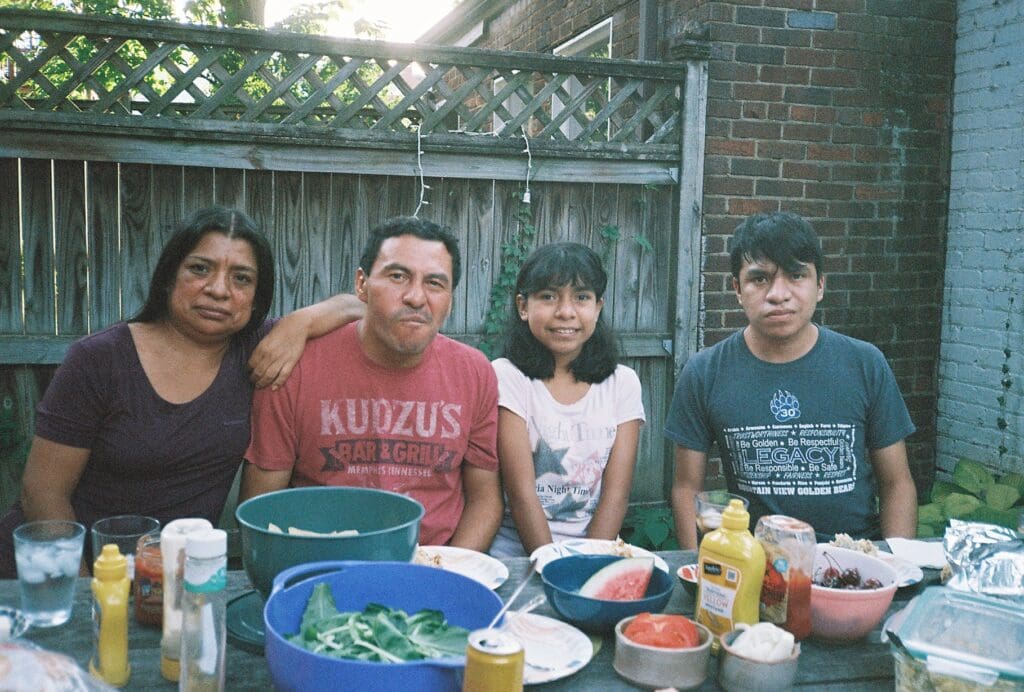
Mirna, Mario, Nicole, and Abner during the Fourth of July gathering with their private sponsor group, TDC Refugee Community Circle.
Haz click aquí para leer en español.
In the heart of the nation’s capital and surrounding areas in Washington, D.C, Maryland and Virginia (DMV), a vibrant community of young professionals under 40 is making a profound impact through the Welcome Corps. This private sponsor group, known as TDC Refugee Community Circle, began when Holly, a freelancer, returned home from traveling abroad. She was inspired by a conversation with a program manager at a local organization in Thailand to approach her friend Jackie about sponsoring a refugee family.
“As an American citizen, I had an incredible opportunity to make a difference,” Holly recalled, realizing that her resources could significantly change someone’s life.
Jackie eagerly agreed. Already involved in refugee issues professionally, sponsorship ignited a deeper passion for Jackie as she participated hands-on in resettlement of Afghan families after the fall of Kabul in 2021.
“The connection to refugees became more than just a job for me; it transformed into a personal mission,” she shared.
The rest of the group fell into place when Jackie introduced Holly to several others, including Matt and Claire, a newly married couple seeking ways to stay grounded in their values.
“This was before we were married, but we just talked about how this could be a really cool thing to try to do when we’re married,” Claire said. “When you’re a 20 or 30 something in Washington, D.C., there’s a good chance that you have a decent amount of social capital.”
Together with their church and broader social networks, the young professionals prepared to welcome a family of four from Guatemala.
The Power of Community Support
From the start, the TDC group was amazed by the level of support they received. Their church community, in particular, provided in-kind donations and access to a community fund before they welcomed the refugee family they were expecting.
“Our church has a listserv where people frequently post about anything,” Claire said. “So I posted that we were looking for some in-kind donations for furniture.”
Soon the group had a couch, beds, and all the furniture they needed to ensure the refugee family had a place to call home.
“We were turning stuff away because we had so many people give us things,” Holly recalled, overwhelmed by the generosity of their community. “It was probably 30 people that helped us move because so many people just showed up.”
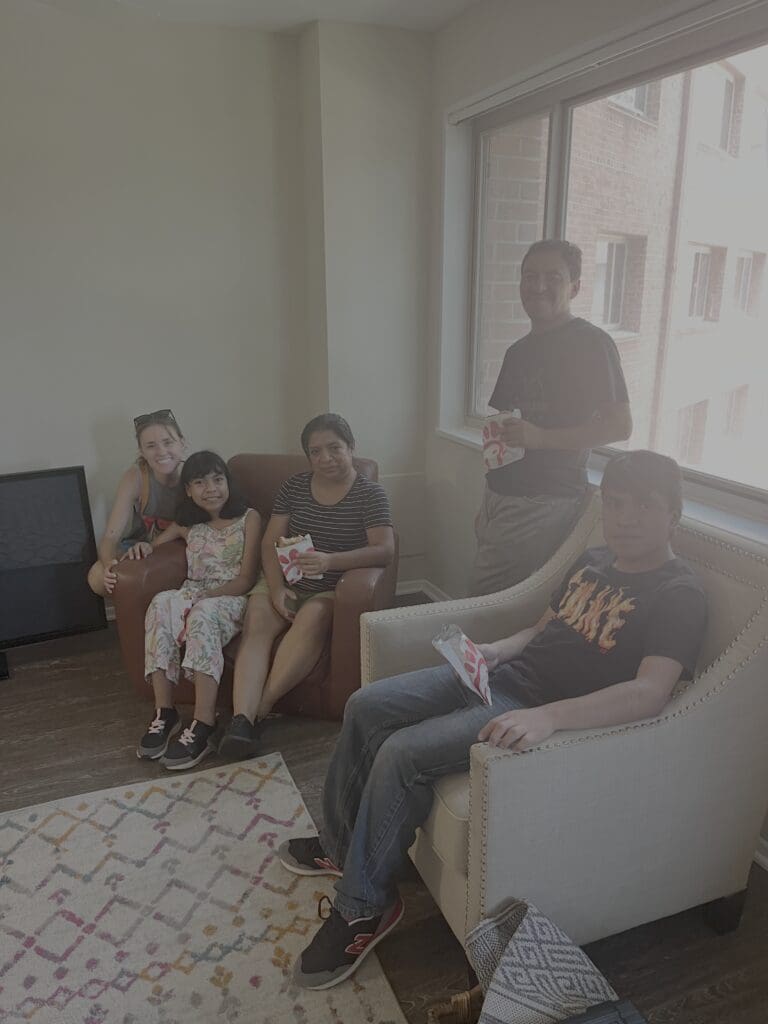
And with all of this support, they also had each other. “Being part of a group working towards the goal of supporting someone is a reminder that we can do something,” Claire said.
In addition to the group’s local community, TDC received virtual support from Home for Refugees USA, their Private Sponsor Organization (PSO), based in Los Angeles. Home for Refugees assisted with preparing for arrival, including providing information and support on how to apply for benefits and services once the family arrived.
First, though, they headed to greet the family at the airport.
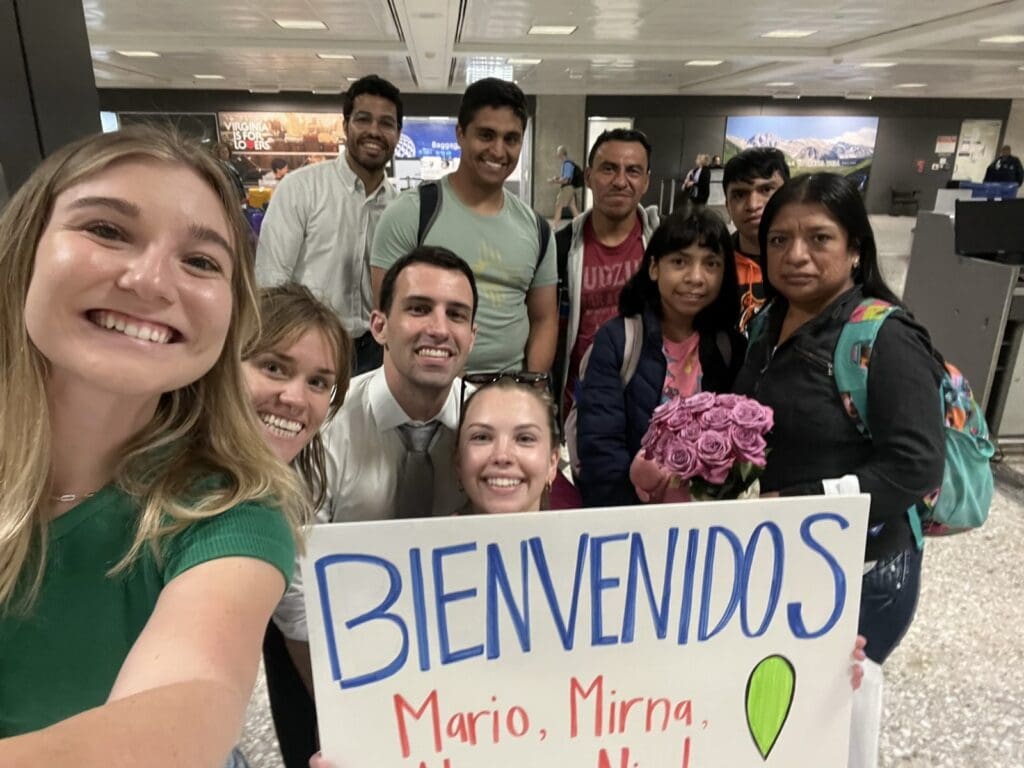
The first meeting at the airport between Jackie, Holly, Matt, Claire, David, and Sam from the TDC group when Mirna, Mario, Nicole, and Abner just arrived from Guatemala.
A Heartfelt Transformation
Holly recalled the warm May day when the sponsors first met the refugees arriving after a long flight.
“When the family arrived, they were really afraid because they were coming from a dangerous situation into a country that they didn’t know and didn’t know how to navigate,” she said. “Everybody was a little nervous, and everybody’s Spanish was rusty.” Yet they took these moments—and many others—with a dose of humor. “We were all laughing at my attempts at Spanish.”
For Holly, the difference between that first day and now has been transformational. “It’s really rewarding to be in the room with them and be able to look back on that progress and see how far we’ve all come together,” she said. “You can just see now that they have a confidence and a sense that they know how to take care of themselves [in America].”
Holly, Jackie, Matt, Claire and the rest of the members of their group were also learning a lot about refugee resettlement and sponsorship. At first, they thought the family would need to wait for employee documentation to find jobs, but they quickly learned refugees are automatically authorized to work in the United States upon arrival. This meant they could help with finding employment earlier than they expected.
Leaning into their social capital, the sponsors began reaching out to personal connections for openings while helping the family’s adults apply independently.
“The husband’s first job was a connection that I’d had,” Holly explained. “We spent time with them, looking at different websites, showing them how to apply, and helping them with resumes.”
With the support of TDC and the surrounding community, the couple secured multiple jobs and now hold three positions between them. Holly was optimistic, noting that while they’d like more hours, it’s currently “enough” to meet their needs.
Making Memories
The group was excited to introduce the family to American traditions, and about halfway through their sponsorship journey, they hosted a Fourth of July cookout for the family. As they gathered in Holly’s backyard, it was the first time grilling for the sponsors, too.
“We explained, this is how a lot of Americans celebrate this holiday. It’s funny because we kept being like, this is quintessentially American, but we had actually never grilled before. So I was learning how to grill, too,” Holly laughed.
Everyone dressed in red, white, and blue, embodying the holiday spirit. The highlight of the day came after the cookout when they sat down to play a game of Uno. Holly and her group had gifted the family a pack of Uno cards, explaining that it was a game they could play in either English or Spanish.
“There definitely are times where both parties know they don’t really understand each other, but it just makes the relationship sweeter. You kind of just laugh about it and keep going… There’s still so much you can enjoy together and bond over, even with these cultural and language barriers.”
Holly, Welcome Corps Sponsor
Cards were dealt, and the game unfolded much to the amusement of everyone present. While the father struggled to grasp the rules of the game, his 11-year-old daughter brought her customized deck where she had filled in special “attack” cards.
“Her attacks were so extreme. It was like, taking the entire deck!” Holly smiled. “But it was so cute to see that she had been playing with it and customized it. She was really excited that we were going to play.”
Despite the cultural and language barriers, Holly remembers how these moments brought everyone closer. “There definitely are times where both parties know they don’t really understand each other, but it just makes the relationship sweeter. You kind of just laugh about it and keep going,” she said. “There’s still so much you can enjoy together and bond over, even with these cultural and language barriers.”
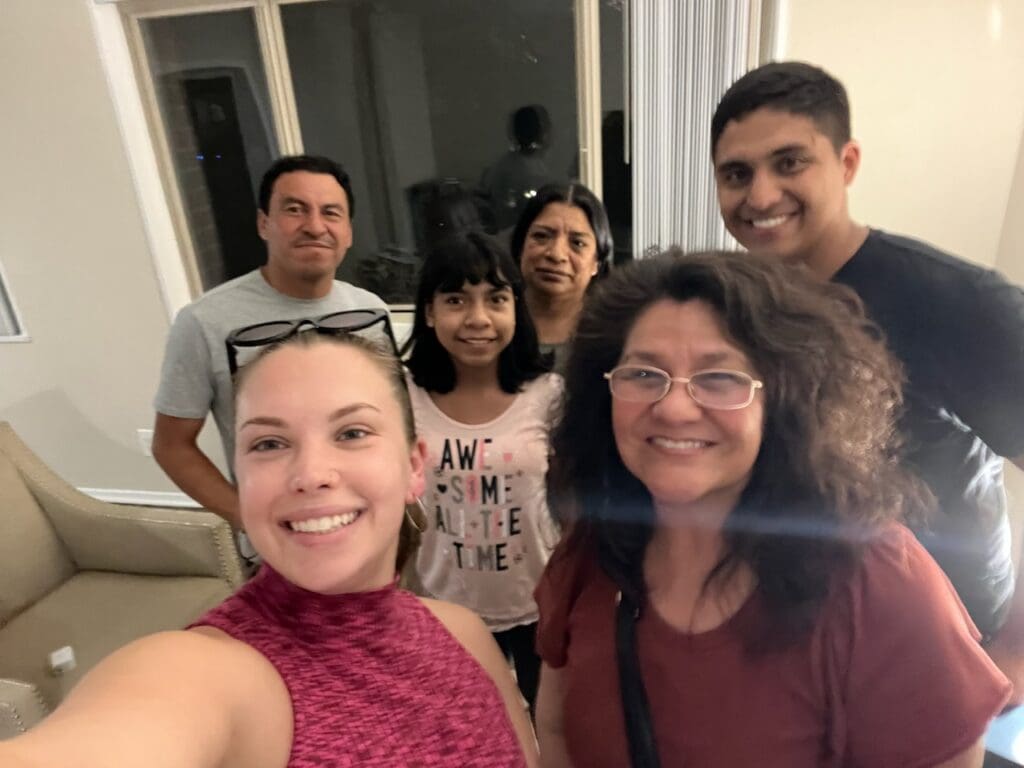
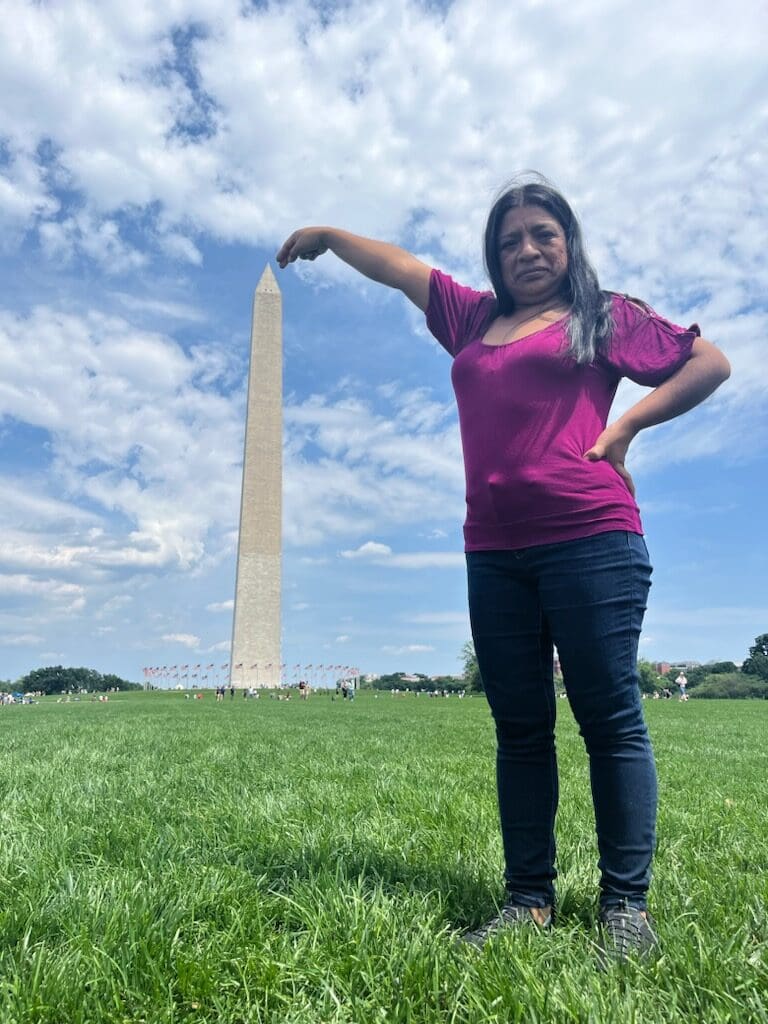
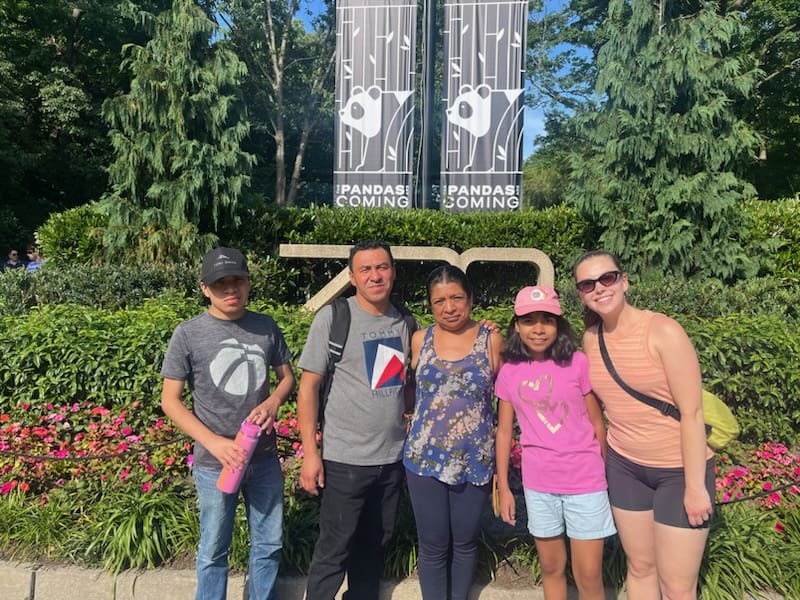

Mirna, Mario, Nicole, and Abner during the Fourth of July gathering with their private sponsor group, TDC Refugee Community Circle.
“It’s both a great way to serve refugees that are coming to the United States, but also a really cool way to learn more about your community.”
Jackie, Welcome Corps sponsor
The group’s collective background in refugee work provided them with a solid foundation, but they attribute a lot of their success from reaching out to different family, friends, and community members for support and their ability to mobilize resources effectively.
TDC leveraged their skills with tools like Google Docs and Spreadsheets to organize their efforts and make the process manageable despite their busy schedules. As the group coordinator, Holly organized logistics for moving day. Despite not having a car at the time, she organized a massive effort using a spreadsheet to coordinate volunteers across different locations.
“It’s both a great way to serve refugees that are coming to the United States, but also a really cool way to learn more about your community,” Jackie said about learning which social service systems were easiest to navigate in the area and familiarizing herself with the true diversity of grocery stores, places of worship, and community groups, particularly in Northern Virginia.
Though their official sponsorship journey concluded in August, the relationship between the TDC group and the refugee family is far from over. They’ve since begun a new tradition of sharing monthly dinners, strengthening the bonds that have formed and maintaining connectivity that is crucial for refugees starting out in the United States.
“There’s enough of us that I think for years to come, at least some of us will be in contact with the family,” Holly shared. “It’s really significant to this family that they know Americans and they’re not in this foreign country all alone. They have six numbers in their phone that they can call.”
Jóvenes Profesionales le Dan la Bienvenida a una Familia Refugiada en el Distrito de Columbia

En el corazón de la capital de los Estados Unidos y sus alrededores en Maryland y Virginia, un grupo vibrante de jóvenes profesionales menores de 40 años está marcando una diferencia significativa a través del Welcome Corps. El grupo, conocido como TDC Refugee Community Circle, se formó cuando Holly, una trabajadora independiente, regresó a casa tras viajar al extranjero. Inspirada por una conversación con un gerente de programas en una organización local en Tailandia, decidió hablar con su amiga Jackie sobre la posibilidad de patrocinar a una familia refugiada.
“Como ciudadana estadounidense, tuve una oportunidad increíble de marcar la diferencia”, recordó Holly, al darse cuenta de que sus recursos podrían cambiar significativamente la vida de alguien.
Jackie, quien trabaja en temas de refugiados, aceptó con entusiasmo. Ella conocía bien la importancia del patrocinio, ya que participó directamente en el reasentamiento de familias afganas tras la caída de Kabul en 2021.
“La conexión con los refugiados dejó de ser solo un trabajo para mí; se convirtió en una misión personal”, compartió.
El resto del grupo de patrocinadores se unió cuando Jackie presentó a Holly a unos amigos, incluyendo a Matt y Claire, una pareja recién casada que andaba en búsqueda de oportunidades para demostrar sus valores.
“Esto fue antes de casarnos—hablamos sobre cómo [esta oportunidad] podría ser algo muy interesante para intentar ya después de casarnos”, dijo Claire. “Cuando uno tiene 20 o 30 años en Washington, D.C., es probable que tengas una buena cantidad de capital social”.
Juntos, con el apoyo de su iglesia y sus conexiones comunitarias, los jóvenes profesionales se prepararon para dar la bienvenida a una familia de cuatro personas proveniente de Guatemala.
El Poder del Apoyo Comunitario
Desde el principio, el grupo TDC quedó asombrado por el nivel de apoyo que recibieron. En particular, su comunidad eclesiástica les brindó donaciones en especie y acceso a un fondo comunitario antes de recibir a la familia refugiada que esperaban.
“Nuestra iglesia tiene una red de listas de correo donde la gente publica con frecuencia sobre cualquier cosa”, explicó Claire. “Así que publiqué [allí] que estábamos solicitando donaciones en especie para muebles”.
Pronto, el grupo consiguió un sofá, camas, y todos los muebles necesarios para asegurar que la familia refugiada tuviera un lugar al que llamar hogar.
“Tuvimos que rechazar [algunos muebles] porque tanta gente nos dio cosas”, recordó Holly, conmovida por la generosidad de su comunidad. “Probablemente fueron unas 30 personas las que nos ayudaron con la mudanza…”.
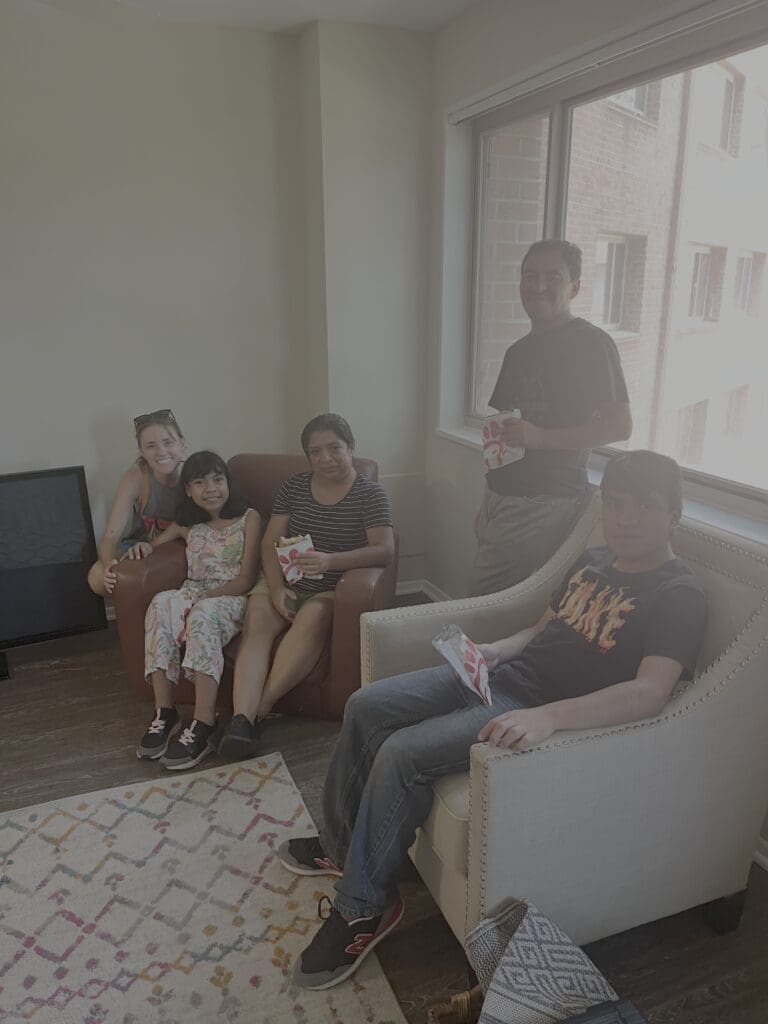
Y con todo este apoyo, los miembros del grupo también se tenían el uno al otro. “Ser parte de un grupo que trabaja hacia el objetivo de apoyar a alguien es un recordatorio de que si podemos lograr algo”, dijo Claire.
Además del apoyo de su comunidad local, el grupo TDC recibió apoyo virtual de Home for Refugees USA, su Organización Patrocinadora Privada (PSO) con sede en Los Ángeles. Home for Refugees los ayudó a prepararse para la llegada de la familia, aportando información sobre cómo solicitar beneficios y servicios una vez que llegaran.
Pero primero, se dirigieron al aeropuerto para recibir a la familia.

El primer encuentro en el aeropuerto entre Jackie, Holly, Matt, Claire, David y Sam del grupo TDC, cuando Mirna, Mario, Nicole y Abner acababan de llegar de Guatemala.
Una Transformación Conmovedora
Holly recordó el cálido día de mayo cuando los patrocinadores conocieron por primera vez a los refugiados que llegaban tras un largo vuelo.
“Cuando la familia llegó, estaban realmente asustados porque venían de una situación peligrosa a un país que no conocían y donde no sabían cómo manejarse,” comentó. “Todos estábamos un poco nerviosos, y nuestro español estaba oxidado.” Sin embargo, enfrentaron estos momentos—y muchos otros—con una buena dosis de humor. “Nos reímos mucho de mis intentos de hablar español.”
Para Holly, la diferencia entre ese primer día y el presente ha sido transformadora. “Es realmente gratificante estar en la misma habitación con ellos, reflexionar sobre ese progreso y ver lo lejos que hemos llegado juntos,” dijo. “Ahora se nota que tienen una confianza y un sentido de que saben cómo cuidarse por sí mismos [en Estados Unidos].”
Holly, Jackie, Matt, Claire y el resto de los miembros de su grupo también estaban aprendiendo mucho sobre el reasentamiento de refugiados y el patrocinio. Al principio, pensaban que la familia tendría que esperar a recibir documentación laboral para encontrar empleo, pero pronto aprendieron que los refugiados están automáticamente autorizados para trabajar en los Estados Unidos desde su llegada. Esto significó que podían comenzar a ayudarlos a encontrar empleo antes de lo esperado.
Aprovechando su capital social, los patrocinadores comenzaron a contactar a sus conexiones personales para buscar oportunidades mientras ayudaban a los adultos de la familia a postularse de forma independiente.
Creando Recuerdos
El grupo estaba emocionado de presentarles a la familia las tradiciones estadounidenses, y a mitad de su viaje de patrocinio, organizaron una parrillada del 4 de julio para la familia. Mientras se reunían en el jardín de Holly, fue la primera vez que los patrocinadores también hicieron una parrillada.
“Les explicamos, así es como muchos estadounidenses celebran este día festivo. Es gracioso porque seguíamos diciendo, esto es lo más estadounidense que hay, pero en realidad nunca habíamos hecho una parrillada antes. Así que también estaba aprendiendo a asar,” se rió Holly.
Todos se vistieron de rojo, blanco y azul, personificando el espíritu de la festividad. El momento culminante del día llegó después de la parrillada, cuando se sentaron a jugar una partida de Uno. Holly y su grupo le regalaron a la familia un paquete de cartas de Uno, explicando que era un juego que podían jugar tanto en inglés como en español.
“Definitivamente hay momentos en los que ambas partes saben que no se entienden completamente, pero eso solo hace que la relación sea más dulce. Simplemente te ríes y sigues adelante… Todavía hay mucho que puedes disfrutar juntos y compartir, incluso con estas barreras culturales y lingüísticas.”
Holly, patrocinadora del Welcome Corps
Se repartieron las cartas, y el juego se desarrolló con mucho entusiasmo entre todos los presentes. Mientras el padre luchaba por entender las reglas del juego, su hija de 11 años trajo su baraja personalizada, en la que había llenado cartas especiales de “ataque”.
“¡Sus ataques eran tan extremos! ¡Era como si tomara toda la baraja!” sonrió Holly. “Pero fue tan lindo ver que ella había jugado con las cartas y las había personalizado. Estaba muy emocionada de que íbamos a jugar.”
A pesar de las barreras culturales y lingüísticas, Holly recuerda cómo estos momentos juntaron a todos. “Definitivamente hay momentos en los que ambas partes saben que no se entienden completamente, pero eso solo hace que la relación sea más dulce. Simplemente te ríes y sigues adelante,” dijo. “Todavía hay mucho que puedes disfrutar juntos y compartir, incluso con estas barreras culturales y lingüísticas.”
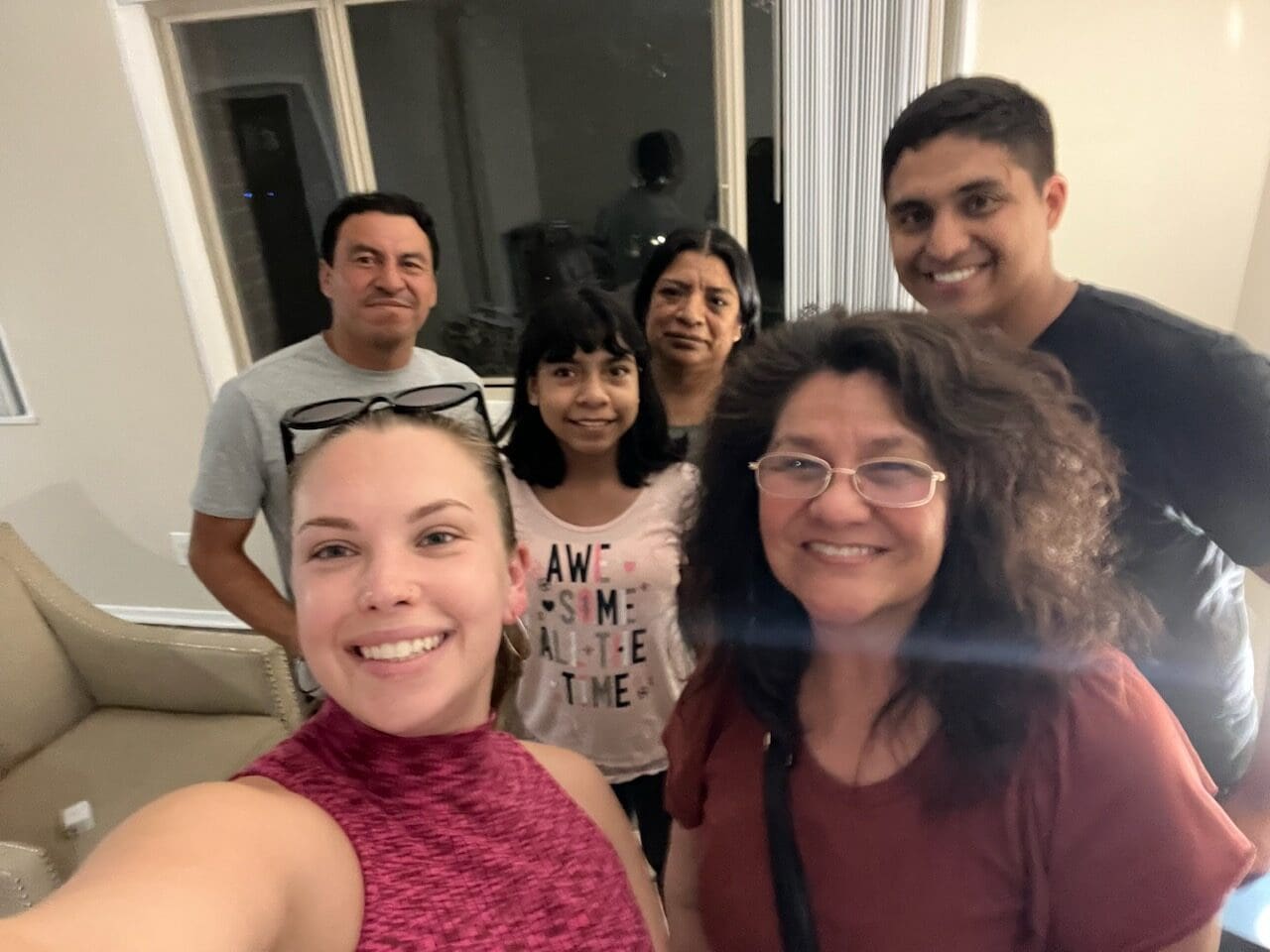
Claire y Matt del grupo TDC acompañando a la madre de Matt a visitar a la familia.



“Es una gran forma de servir a los refugiados que llegan a los Estados Unidos, pero también una manera realmente genial de conocer más sobre tu comunidad.”
Jackie, patrocinadora del Welcome Corps
La experiencia colectiva del grupo en trabajar con refugiados les proporcionó una base sólida, pero atribuyen gran parte de su éxito al hecho de haber contactado a diferentes familiares, amigos y miembros de la comunidad en busca de apoyo y su capacidad para movilizar recursos de manera efectiva.
TDC aprovechó sus habilidades con herramientas como Google Docs y hojas de cálculo para organizar sus esfuerzos y hacer el proceso manejable a pesar de sus apretadas agendas. Como coordinadora del grupo, Holly organizó la logística para el día de la mudanza. A pesar de no tener coche en ese momento, organizó un esfuerzo masivo utilizando una hoja de cálculo para coordinar a los voluntarios en diferentes ubicaciones.
“Es una gran forma de servir a los refugiados que llegan a los Estados Unidos, pero también una manera realmente genial de conocer más sobre tu comunidad,” dijo Jackie, quien aprendió cuáles sistemas de servicios sociales eran más fáciles de navegar en la zona y se familiarizio con la verdadera diversidad de tiendas de comestibles locales, lugares de culto y grupos comunitarios, particularmente en el norte de Virginia.
Aunque su etapa oficial de patrocinio concluyó en agosto, la relación entre el grupo TDC y la familia refugiada está lejos de haber terminado. Desde entonces, han comenzado una nueva tradición de compartir cenas mensuales, fortaleciendo los lazos que se han formado y manteniendo la conexión, que es crucial para los refugiados que comienzan en los Estados Unidos.
“Somos suficientes como para que, por muchos años, al menos algunos de nosotros estemos en contacto con la familia,” compartió Holly. “Es muy significativo para esta familia saber que conocen a estadounidenses y no están en este país extranjero completamente solos. Tienen seis números en su teléfono a los que pueden llamar.”